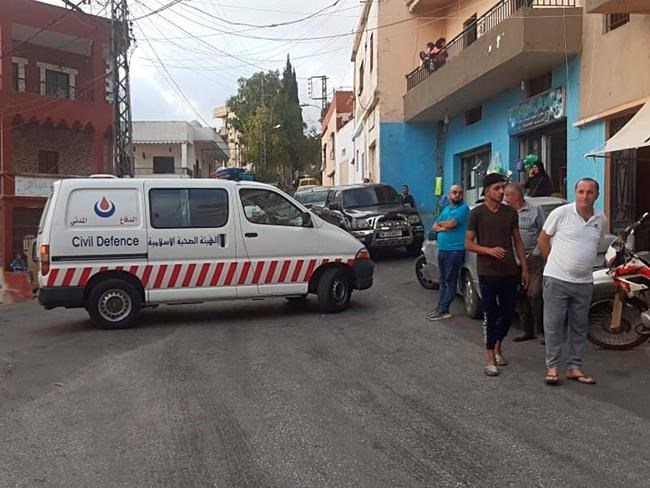
A Hezbollah civil defense ambulance block a road that leads to the site of an explosion that rocked a Hezbollah stronghold, in the southern village of Ain Qana, Lebanon, Tuesday, Sept. 22, 2020. The powerful explosion sent thick grey smoke billowing over the village, but the cause was not clear. (AP Photo/Mohammed Zaatari)
Republished September 22, 2020 - 10:15 AM
Original Publication Date September 22, 2020 - 6:06 AM
AIN QANA, Lebanon - A powerful explosion shook a Hezbollah stronghold in southern Lebanon on Tuesday, sending thick grey smoke billowing over the village, but the cause was not clear.
The Lebanese army said the blast occurred in a building in the southern village of Ain Qana, above the port city of Sidon, and that it was investigating. Lebanon's official news agency, NNA, said the explosion coincided with intense Israeli overflights “that did not leave the skies” over the area since Tuesday morning.
It said the cause of the explosion, which damaged buildings, shattered windows and caused panic among residents, was not known.
The mysterious blast added to collective anxiety in a country still reeling from last month's massive explosion in Beirut and struggling with an unprecedented economic crisis.
“Thank God that there were no human losses, but there was a lot of panic, everyone was frightened," said a villager who identified himself by his last name, Honeina.
The Israeli military declined to comment. Hezbollah and Israel fought a month-long war in 2006. Since then, the Iran-backed militant group is believed to have expanded its arsenal, amassing tens of thousands of rockets and missiles that can hit virtually anywhere in Israel.
Hezbollah members imposed a security cordon around the blast area Tuesday, barring journalists from reaching it. Footage broadcast by the local Al Jadeed station showed damage to buildings and debris scattered across a large area. The shaky footage also showed what appeared to be a minibus on fire. Other footage showed a wrecked SUV parked outside a damaged house.
The mysterious blast comes seven weeks after the giant explosion at Beirut's port, caused by the detonation of nearly 3,000 tons of improperly stored ammonium nitrate. That explosion killed nearly 200 people, injured 6,500 and damaged tens of thousands of buildings in the capital.
It is still not clear what caused the initial fire that ignited the chemicals, and so far no one has been held accountable.
A Hezbollah official said there were no casualties from Tuesday's explosion and that no Hezbollah members were targeted. Another local Hezbollah official in Ain Qana, Ali Nazar, said the explosion destroyed a house where old mines and shells leftover from "past Israeli aggression” were being collected by a de-mining agency for disposal.
A Lebanese security official in southern Lebanon said the explosion occurred in a Hezbollah arms depot in the village, but did not elaborate on the cause. The official spoke on condition of anonymity in line with regulations.
Israel violates Lebanese air space on an almost daily basis, and its aircraft have flown particularly low over many areas in the past few days. The commander of the U.N. peacekeeping force in southern Lebanon, Maj. Gen. Stefano Del Col, told NNA Monday that the force has in recent days recorded a large number of air violations by the Israeli military.
He said the continuous overflights constitute a violation of U.N. Security Council Resolution 1701 and Lebanese sovereignty.
“Such continued violations lead to an escalation of tension and can lead to incidents that threaten the cessation of hostilities between Lebanon and Israel,” he was quoted as saying.
Israel accuses Hezbollah of violating the same U.N. resolution by operating close to the border, where it says the militants maintain forward operating posts and dig tunnels intended for future attacks.
Neither side is believed to be seeking war, but both have warned that the next round of hostilities will be far more devastating to the other side than the 2006 conflict.
___
Karam reported from Beirut.
News from © The Associated Press, 2020